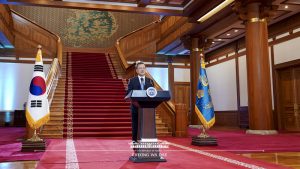The presidential Blue House hosted a New Year’s press conference on January 18, utilizing a hybrid in-person and online format to hold the conference safely in the middle of the COVID-19 pandemic.
President Moon Jae-in already given a New Year’s address on January 11 but this time he answered questions from various journalists representing both local and international press. Only 20 reporters were able to attend the press conference in person while 100 reporters asked questions via the Blue House’s online platform.
The press conference lasted for about two hours from 10 a.m. to 12 p.m. It covered diverse topics, including quarantine measures for the COVID-19 pandemic, social issues, politics, economy, foreign affairs, and national security.
Local news reporters generally asked questions about domestic affairs such as politics, housing prices, and the economy. In contrast, foreign correspondents usually asked questions about foreign affairs and national security – and most of them asked questions related to North Korea.
At the press conference, Moon clarified that he is willing to meet North Korean leader Kim Jong Un again to resume the stalled dialogue between the two countries. Since the 2019 Hanoi Summit ended early with no deal, the North has been less interested in dialogue. U.S. President Donald Trump was the one who left the Hanoi Summit with no deal; however, the North has aimed its wrath at the South by blowing the joint liaison office in Kaesong and adopting harsher rhetoric (for example, denouncing a South Korean government official’s comments over its quarantine measures last year).
Since then, North Korea has signaled its continued commitment to developing nuclear weapons and missile in a bid to make the U.S. to lift the devastating economic sanctions led by the United Nations. Despite that, Moon believes “Kim has a clear will for peace, dialogue, and denuclearization of the North.” That belief is based on the three inter-Korean summits held in 2018.
“What the North demands is that the security of its regime be guaranteed by the U.S., and the relations between North Korea and the U.S. be normalized,” Moon said in the press conference.
With about a year and four months left before Moon leaves office, he admitted that he does not have much time to bring about results on the North’s denuclearization. Moon said he will do his best for the last time, leaving open the possibility of another inter-Korean summit. If that happens, it is highly likely that Seoul will be the venue for the fourth inter-Korean summit, based on Moon’s remarks.
Moon said “Kim’s visit [to Seoul] was agreed upon between the two Koreas” during the summits and “hope it will happen someday” before he leaves the Blue House. However, Moon made clear that Kim’s visit to Seoul is not a prerequisite for having a summit again, saying that “if the meeting continues and trust builds, his visit [to Seoul] will be made someday.”
Kim’s visit to Seoul would have a significant impact not only on the two Koreas but also on the United States. No North Korean leader has visited the South Korean capital since the two countries separated. Such a visit could be a signal to declare the formal end of the Korean War, which was in an active phase from 1950 to 1953. The South Korean government believes that one of the difficulties in negotiating with North Korea is that the Korean War never formally ended; instead, hostilities were concluded with an armistice agreement. That means the two Koreas technically remain at war.
For its part, however, Pyongyang has shown little interest in talking to Seoul for its own sake. North Korean officials often belittle government statements from the South and have even explicitly told Seoul not to act like it is an important key in the U.S.-North Korea denuclearization negotiations and summit. Pyongyang prefers to deal directly with Washington on denuclearization and sanctions removal. That appears to be the reason why Pyongyang has refused to accept Seoul’s proposals of support amid the pandemic, according to experts.
Speaking two days before President Joe Biden’s inauguration in the United States, Moon expressed his expectation that the Biden administration will treat North Korea’s denuclearization as one of its top priorities. “With the inauguration of the Biden administration, I believe it has provided a turning point to start the U.S.-North Korea dialogue and inter-Korean dialogue anew,” Moon said.
Biden left open the possibility of meeting Kim during his campaign, but he said such a meeting could only happen after Kim agrees to draw down his nuclear power. He made clear that meeting Kim with no preconditions and little preliminary negotiations – the way Trump did – will not be acceptable for his administration.
Those who will be in charge of dealing with North Korea in the Biden administration will be more conservative and stricter about negotiating with the North. However, Moon said that they are generally familiar with Korean Peninsula issues and in favor of ways of solving problems through dialogue. He predicts that they will not step back from the negotiating table as the Obama administration did under its “strategic patience” formula, hoping for the North to give up its nuclear power by itself.
Last week, North Korea held a military parade unveiling new advanced submarine-launched ballistic missiles. It did not display intercontinental ballistic missiles that can attack the U.S. mainland, but Kim made clear that the North will continue developing its missile programs and nuclear capabilities unless the U.S. lifts the economic sanctions toward it.
Moon has a tough slog ahead to persuade the U.S. and North Korea to make peace. The two countries have not entirely ruled out reopening negotiations, but as it stands no one is willing to make concessions. That means the dialogue between the two is unlikely to resume for now.

































